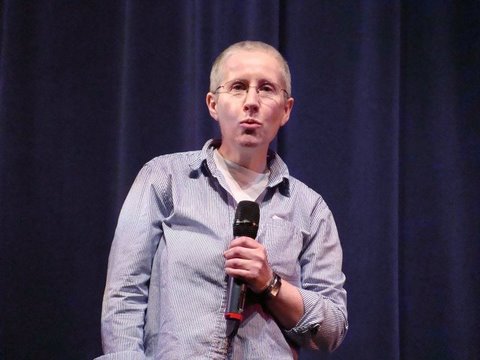
Joan Hanna: We were so happy to have your poem, “The Autobiography of Miss Jane Doe” as part of our July Issue. Your poem is a fascinating view of responses that attempt to reconstruct a life from recovered bones. Can you share with our readers why you became fascinated by this topic?
Jude Marr: I guess the idea of Jane came to haunt me through a TV documentary I watched about a year ago. The show I saw used a mixture of CSI-type techniques and
historical research to reconstruct a young woman’s life story from her recovered bones. The bones weren’t that old—from the mid-nineteenth century—and as I watched, I became more and more uncomfortable with the implications of fleshing out a person—someone who lived in the lifetime of my great-grandparents—from her disinterred remains. The real Jane Doe’s age, her likely death from venereal disease, and her passive, post-mortem exposure as a source of entertainment all produced a deeply-felt, and deeply feminist, response in me.
JH: Knowing that you had such a feminist response to this incident I find it very interesting that you used a technique of multiple voices in this poem. I wonder if you would give our readers a little bit of insight as to why you chose to represent the academic, artistic and archeological in this way?
JM: In fact, the original version of this poem had only one voice. When I began to write, I was very focused on expressing my reaction to what seemed to me a particularly egregious example of the objectification of women—in academia, in art, and even in advanced decomposition. However, I eventually came to realize that, although I felt better for having turned my ire into irony, I was as guilty as anyone of using “Jane” without her permission. Of course, there’s no other way to write about someone long dead, but at least I could give this young woman another name and a chance to tell her own story. I liked setting my imagination against dry bones. And—for me, the nicest irony—May’s tale turned out to be rather different than science expected.
JH: “The Autobiography of Miss Jane Doe” version in our July issue is very different from the one voice version of the original poem. There was a strong editing component in getting “The Autobiography of Miss Jane Doe” ready for publication on r.kv.r.y. Can you elaborate a little about that experience with our readers?
JM: Yes, indeed. Well, I submitted the poem without May’s voice. And I was absolutely delighted to get any feedback, let alone the positive offer of editorial input. I’m relatively new to the process of sending my poems out into the world. I’ve had a couple of other things accepted—which was extremely pleasing, of course—but I think I got even more of a thrill out of working with you guys to improve what I submitted. That’s when I felt like a real writer. Both the original critique of the poem’s tone and the suggestion of adding another voice brought me to the realization I described above, and I believe to a much better poem—one that’s at least as much felt as thought.
JH: Thank you so much for giving our readers a glimpse into the evolving writing process for this poem. Do you have a website or links to other publications or projects you would like to share with our readers?
JM: I don’t have a website, although all kinds of people tell me that I should. Maybe now that I’m embarking on my MFA at Georgia College, I’ll have the time and the courage to take more than baby steps toward the web-version of my life. I can, however, offer a link to two of my poems which appeared in a recent edition of The Cortland Review
JH: Thank you, Jude, for taking the time to interview and share your fine work with r.kv.r.y. Congratulations on entering the MFA program at Georgia College, I’m sure that will be an amazing experience for you. I have one final question: can you share with our readers what recovery means to you?
JM: I’ve been thinking about this a lot. I guess I have a habit of talking all around a subject, even when I know what I most want to say, but this time I’m going to keep it simple. Simply, for me, recovery means strength.
And thank you so much, for liking my work enough to publish it, and for giving me this chance to expand. I’ve loved the whole process, and I’m telling all my friends!

Pingback: “The Autobiography of Miss Jane Doe” by Jude Marr | Rkvry Quarterly Literary Journal